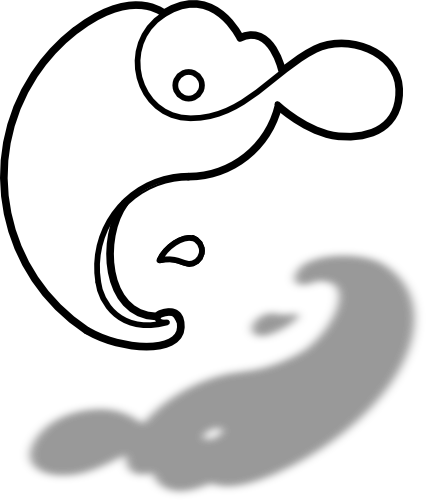They don’t have a brain really and kinda just float there. Do they even feel pain?
After having kept jellyfish as pets (Atlantic bay nettles), I wouldn’t really consider them to be vegetarian nor vegan. While similar to plants, seemed to have a greater sense of environmental awareness than my plants. Mine could sense light, have “off days”, and interact with their environment. It’s probably true that there’s not much going on there due to the small amount of nerves that control everything, but even when mine would accidentally get caught on tank cleaning tools or get bumped around they’d react in a protective way and to me it’s just similar enough to animalistic behavior that I’d not feel comfortable consuming them if I were vegan.
Don’t most plants sense light and interact with their environment?
Tardigrades have been observed reacting defensively to danger, even offensively. I know they’re not plants, but do they feel pain? What about brine shrimp?
Jellyfish are super weird because they really blur the lines between plant/animal. It’s a really interesting question to ask honestly.
So is this theory of veganism to not cause pain to an animal? If so what about ethically sourced meat. Like bullet to the head/decapitation. Most of those creatures feel nothing, they just end.
Or is it to not eat anything that comes from the an organism from the Animalia kingdom because harming animals is immoral?
After proofreading, these sound more aggressive/argumentative than i had intended but they get the point across.
Veganism means to reduce the suffering and exploitation of animals as much as practically possible.
There is nothing ethical about killing a living being that doesn’t want to die.
I mean, sometimes its ethical. Its kind of unnecessary (and therefore immoral) at the scale of modern meat farms. But on a more individual level with like subsistence hunting/livestock, i dont feel like there are any ethical problems. Like if you need food or you will die, animals lives are worth less than humans lives…
The need to hunt for food to prevent dying yourself is not really a problem in today’s society unless you are indigenous and living outside of our society. So there is no real argument there.
I mean, yeah. Im also being pedantic with unqualified absolutes.
The fact remains sometimes it absolutely is ethical to kill stuff, even if they don’t want to die.
My general ethical foundation is based on my conscience saying “that would be bad” or “seems ok”. I fully admit that this is potentially a personal flaw, but I don’t feel bad about eating meat. I have a vague sense of guilt for the treatment of meaty animals, but honestly, it isn’t enough to offset the convenience of a burger.
Tldr sometimes its ethically okay to kill stuff, and I’m too lazy to do anything about benefitting from the majority of times when it isn’t ethical.
I respect the self-reflection in this comment. Sadly, I also feel a small need to ask you to think about ethics and morality slightly deeper. Imagine if your predecessors made similar comments about [insert moral failing of history]. How would you think about that?
I think most of us try to be good people, but it’s really hard to do the right thing if you never think about what is right and why (and yes, sometimes that includes not being lazy).
There is an assumption here that i don’t think of right and wrong. Which isn’t true, as evidenced by this entire comment chain. My morality is based off of my conscience, and it has a final say in how i act. But I still think and explore ethically difficult situations to determine what is right, wrong, or grayish.
I just didnt describe my entire ethical schema, because, as i said i am lazy. Lazy and self-aware enough to know that there is not much i can or will do to improve the morality of meat consumption. And honestly, that specific problem is pretty low on my list of ethical dilemmas. But it’s fun to talk about.
I thought it had less to do with suffering and exploitation (animals do this to each other, no way to stop that nor should we) but more to do with climate change. Cattle farms are causing massive climate change for instance.
Humans are moral agents, though. Just because something happens in nature, that doesn’t make it okay. There are lots of examples of rape among wild animals, but that doesn’t make it okay for humans to do it.
A lot of vegans are concerned about climate change, too, but it’s really tangential to the philosophy. Veganism came out of the animal rights movement, so it’s really concerned with exploitation and suffering. If there were no environmental issues with animal products, vegans would still be vegans.
Morals are a social construct
Just because something is a social construct doesn’t mean it isn’t real or important.
That’s no necessarily true. It’s like saying “society is a social construct”. But I think there are more arguments to see morality as an inevitable result of human nature.
It can be either or both. Whether other animals or people cause suffering to animals isn’t a statement about whether it is ethical for people to do so (naturalistic fallacy).
In terms of strict definitions of what should or should not be eaten based on its suffering, I think that’s much harder to do. There’s always going to be some gray area. Plants respond to stimuli and try to protect themselves. Jellyfish and insects and cultures cells are on a spectrum where it may not be clear how to draw the line.
yeah but what if it tastes good
15 minutes of pleasure from eating doesn’t justify forcing an animal into existence to a life of suffering and premature death, especially when there are so many great alternatives - without even considering the the secondary effects of animal agriculture, including climate damage, antibiotic resistant bacteria, and the likelihood of bringing forward the next pandemic.
I admit animals taste good but that’s still not a good enough reason to kill them. It’s simply unnecessary.
Tell that to lions and eagles. They cause as much suffering as possible. It’s just how nature works. It’s why I really don’t care about veganism.
cannibalism too exists in “nature”. I don’t see any of you meat justifiers treading that line of thought to its coherent end.
a lion or an eagle eats anything. Most (if not all) carcass eating humans make arbitrary choices: Dogs or cats shan’t be eaten. Pigs or this or that is a sin. Eating humans are monstrous.
they cause very little suffering. the systemic factory farming of animals and the deforestation in the process of meat production causes unimaginable collective suffering.
you don’t care about veganism because you are willfully ignorant.
It’s the second one. In the first case, you unnecessarily kill an animal. A fair question would be if it was a natural death of the animal, like you stumbled upon a fresh carcass, is eating that still ethically or morally gray?
But that’s not the point, veganism makes sense in first world countries with factory farming. It’s very clear that mass produced animal products are no go’s.
So is this theory of veganism to not cause pain to an animal? If so what about ethically sourced meat. Like bullet to the head/decapitation. Most of those creatures feel nothing, they just end.
lots (propably most) animals used for farming meat are in pain during their lives.
That’s longer than the time they’re dying in any case.I understand that completely, death isn’t where the suffering usually occurs. This brings me to another question that i proposed in response to a different comment.
I had family that raised a cow to eventually become meat. It was named Tasty and lived up to its namesake. Tasty was treated well and killed quickly and cleanly. Is that, like, bad?
I’d say that’s a philosophical question.
And worse even, I’d say this is something that changes with the culture of people.
a while ago, gladiators killing & maiming each other for entertainment was considered fine.
Raping and Abducting during wartime was normal.Currently, I’d say the cultural moral compass has shifted enough, to consider these two examples rather bad behaviour.
But as Tasty seems to have had a nice life and didn’t suffer, so had it better than most cows which end up in a similar fate, I’d say that currently this would not be considered “bad” behaviour by most people.
Of course there is a viewpoint already out, that all killing of animals is equivalent, in other words equivalent to killing humans. From that point of view, what you did is rather horrific.
Maybe, in some time, when something like lab-grown meat without any nervous system is commonplace, killing animals for food becomes as horrific as we consider killing other humans for food.
Or, you know, it could also swing the other way, and an apocalypse makes Soylent from dead people completely normal food.I’m an oft-invisible lurker, however, your comment is amazing and I appreciate it. Cheers!
Plants feel a lot, they just can’t express their feelings in a way you can perceive. For example, they feel the difference between a human touching them and wind blowing.
At this time it is impossible to know if they feel pain. They’re a living creature.
Plants are also living creatures, but don’t tell the Vegans.
If you want to minimize plant death, going vegan is still the right move.
Most of the crops we grow go to feeding animals that people eat.
This is definitely the best take on veganism.
I don’t really care about minimizing plant death. I’m not Vegan or Vegetarian, nor will I be in the future. I just made a joke.
They told me Lemmy would be more leftist, why am I still seeing 0 IQ vegan jokes
That’s lemmy.ml. I think most of us just want this to be a place with less politics and extremism on either side because it’s exhausting.
What’s more extreme: not wanting to harm and exploit animals or killing and exploiting them to use them as products?
I think it’s pretty clear.
The former, by definition, because the vast majority of society does the latter. Extremists always try to reframe themselves as the moderate ones and say mainstream society are the extremists instead, so I’m not surprised you’re saying this.
Just because it’s always said doesn’t mean it isn’t sometimes true. Can’t you think of examples of views that were fringe but became the moral baseline?
Can’t you think of examples of views that were fringe but became the moral baseline?
Yes, I can, but I can’t think of any that were extreme despite being the most widely held views in a given society, because that’s an oxymoron. Once something becomes a widely held view it is no longer extreme.
We want to be rid of the poop wars
Plants also react to being harmed, so it’s arguable they don’t feel pain.
I remember reading that some species of plants release a specific chemical or audio frequency (I can’t remember which) in response to being cut down, and this chemical is detected by other nearby plants that cause them to become stiffer or something along those lines. Whether that meana the plants feel pain or not, there isn’t anything conclusive. I think it would be pretty hard to feel pain without a nervous system, but its possible that what constitutes pain doesn’t need a nervous system or pain receptors at all. Im not a scientific expert, I just tried to be funny.
Dunno about funny, but insightful and empathetic, yes. Cheers!
People from Vega will object to that.
plants are not “creatures”, neither are animals.<br> both are indeed living evolutures ;)
Do you often write in HTML?
there was something wrong about formatting. Without the HTML code my lines were all huddled into one long line 🤷
How would you define creature?
The word creature is theistic. The person you’re responding to is being pedantic, but isn’t wrong.
Thank you for the definition. I think it is wrong. But i appreciate it nonetheless.
My reasoning is that, while it may have started as a theistic word, it isn’t anymore. When someone says it i don’t think “a creation of God” i just think of like, an animal. Definitions change over time.
thank you :)
deleted by creator
This fact is extremely inconvenient to vegans.
A person who eats meat is responsible for more plant consumption than a person who eats vegan. Livestock don’t live on sunshine and air you know.
The only true way is to live exclusively off of mushrooms or mushroom fed livestock. That way NO plants will be harmed. (The fungus deserves it, so no moral compunctions)
I always remember that plant in Japan that was hooked up to a computer that would get sad if no one talked to it, but will be full of excited energy anytime someone spoke to it.
Now I apologise to a tree if I need to take a leak on it.
do you know what anthropomorphism is?
Yeah I do, I anthropomorphise everything lol, I apologized to my door for bumping it with my wood trollie yesterday.
It might not have feelings, but I do and I felt bad.
my comment was about the word “creature” which implies a creator. It’s understandable that it may be difficult to classify living beings if the criteria is “behavior”
I don’t think anyone other than you thinks the word “creature” implies a creator, so you making that distinction really only gives power to creationists rather than taking it away.
Moreover, even if it does come from creatura, the argument can easily be made that creatures beget (create) other creatures. It seems a very silly and tenuous thing to suddenly muddle a conversation over.
how do you know what everyone thinks?
“beget” doesn’t mean “create”. i don’t muddle the conversation. Creationism is related fundamentally to any conversation about vegetarianism, veganism, speciesism &c.
Ask Abraham. He knows.
We may be able to tell if they are stressed, which could be related to pain, depending on your viewpoint.
Here is a recent study of audible reactions plant can have to stress: https://www.cell.com/cell/fulltext/S0092-8674(23)00262-3
Do plants react to stress and harmful situations like infestation? Absolutely. Do they actually feel pain as we understand it? Probably not since they lack a nervous system.
This boils down to the question: What is pain?
deleted by creator
There is no evidence that they do.
You say this, but do you know anything about the research and science in this regard?
Here’s one intro clip from Wikipedia, there are also many thousands of scientific studies related to learning about how different organisms feel things if you want to learn:
Crustaceans fulfill several criteria proposed as indicating that non-human animals may experience pain. These fulfilled criteria include a suitable nervous system and sensory receptors; opioid receptors and reduced responses to noxious stimuli when given analgesics and local anaesthetics; physiological changes to noxious stimuli; displaying protective motor reactions; exhibiting avoidance learning; and making trade-offs between noxious stimulus avoidance and other motivational requirements.
That is kinda what I was hinting at. If we define pain as something that causes a defensive (or similar) reaction, then sure: Plants react to “pain” in their own way. I have never seen a jellyfish react to “pain” though.
When my chinchilla starts barking, it’s easy to assume that he is in pain or otherwise uncomfortable, but to say that he is truly in pain is impossible. However, when animals hurt their foot and start limping, it’s a good theory that they are reacting to pain. My examples only include mammals though, to your point.
Excuse my rambling. I am not disagreeing with you, but just thinking out loud.
It is impossible to know anything for sure. You can just go with what is the most plausible within our current knowledge. Jellyfish posses a very simple nervous system, even less complex than that of insects. Personally I don’t think it’s possible for them to suffer but since there is no reason to be cruel to them why should I endorse it?
No Brain? For Jellyfish, No Problem
“I think sometimes people use its lack of a brain to treat a jellyfish in ways we wouldn’t treat another animal,” Helm says. “There are robots in South Korea that drag around the bay and suck in jellyfish and shred them alive. I’m a biologist and sometimes sacrifice animals, but I try to be humane about it. We don’t know what they are feeling, but they certainly have aversion to things that cause them harm; try to snip a tentacle and they will swim away very vigorously. Sure, they don’t have brains, but I don’t think that is an excuse to put them through a blender.”
If you care about brainless animals, you might as well care about plants.
Are we not supposed to care about plants?
Jellyfish do have neurons. Fewer than an insect. Much fewer than ChatGPT. But still something. A better example is sea sponges, which don’t have any neurons at all.
Removed by mod
Ok, but the question was whether or not they feel pain. We can definitively say they display escape behaviors when presented with an aversive stimulus, so I’d say it’s likely they do feel some sort of pain, even if their perception of it is nothing like that displayed by animals with central nervous systems.
The morality of shredding them alive by the thousands is a different conversation, but I would say yes, nature is cruel, and yes, it’s possible for humans to mimic nature and kill animals in similar ways, but humans also have a knack for taking things too far, eg chickens bred to be so big they can’t even walk or jellyfish-murdering robots
We can definitely say they display escape behaviours when presented with an adverse stimulus, so I’d say it’s likely they do feel some sort of pain
It’s ironic that your username is “protist”, since even many single cell organisms display escape behaviours when presented with an adverse stimulus.
This is one of those things that’s hard to define. If a popcorn kernel gets too hot, it pops and it’s almost like it’s trying to run from the heat. How is that different from a jellyfish reaction to pain? There’s a lot of good arguments on both sides.
Sometimes, I wonder how far away we really are from the popcorn kernel.
But everyone and everything rather avoid pain, wouldn’t they? And if I would like to treat those the way I would like to be treated, then why not try to help mitigate that pain where possible?
The follow up question would be what us and isn’t pain.
If a bacterium swimming in one direction encounters a toxin and changes direction to avoid dying, did it experience pain? If a tobacco plant reacts to attacks from insects by producing more nicotine and alerting its neighbours to do the same through signals sent through both rhizomes and airborne pheromones, does it experience pain? What about a worker ant, whose behaviour can be perfectly simulated by an algorithm simple enough that you can simulate hundreds of ants interacting?
Personally, I’d say none of these organisms are capable of feeling pain. Or if they are with the help of some definitions of what constitutes pain, it’s just a signal like an automated assembly machine getting a signal from its sensors that a human entered its work space and it needs to slow down its robot arm to snails pace. So still incapable of suffering.
Also, if you set the threshold for what constitutes the ability for suffering too low, you quickly collide with the ethics of even early term abortion.
No, just no
Jellyfish eat animals and animal byproducts, so no, they are not vegan.
Jokes aside, often vegans follow dietary restrictions for reasons other than an ethical or moral belief against causing pain. Many vegans don’t even eat honey, so I imagine jellyfish is pretty safely in non-vegan territory.
Are carnivores plants vegan? Genuinely curious, never looked into it.
Many fertilizers are made from animal products. Are veggies grown with those fertilizers vegan?
Nothing is 100% vegan. Animals have existed on this planet for hundreds of millions of years, and they are a part of its composition. Soil is just fully decomposed plants and animals. No matter how vegan you want to be, you can’t escape eating something that has fed on animal parts directly or indirectly.
My point being that many fertilizers are a product of factory farming. Something that vegans are very much against.
I have heard there are vegans who won’t eat figs since there’s a decent chance of a dead wasp in a fig due to how fig wasps procreate.
Figs you buy in stores don’t have dead wasps in them. But yes, there varieties of figs that do and there aren’t vegan.
If no, what about coprophagic mushrooms (I’m not aware of any fungi that are both edible and coprophagic and also produce fruiting bodies aka mushrooms big enough to possibly harvest)?
Depends what you consider edible. Some varieties of psilocybe grow directly on poop.
Hm, I might have chosen the wrong adjective there. I meant fungi that decompose corpses
Plants aren’t sentient, so yes.
they feel pain, communicate, reproduce, move around, why are plants any different than animals? honest question
Plants may react to damage, but that isn’t the same thing as pain. Plants don’t have a brain or a central nervous system.
Neither do jellyfish and many other animals. Veganism is just arbitrary lunacy.
Here’s a good video on why vegans don’t eat honey. Beekeeping is really just another form of factory farming.
Can’t agree fully.
My mother has a hive in the garden. The bees pollinate our garden, live lives as nice as bee’s lives can be and, at the end of the year, we take some of their honey and replace it with sugar, which the bees don’t care about.
It’s a win-win, nobody is hurt, nobody is taken advatage of.
Two things.
1 - It’s the backyard chicken problem. Yes your mom doesn’t harm them, but when producing at scale people care less about not harming them
2 - Replacing their honey with sugar is not good because it lacks the vitamins and nutrients that honey has. It’s very possible that you don’t take all the honey so they are never harmed by the actions, but when farming at scale people will absolutely push the limit.
My point is, though, that farming doesn’t necessarily have to be done at scale, and when done right, nobody suffers
I agree with your point that it’s possible but not applicable to 99.9% of people
I thought your first sentence was serious at first, since it genuinely makes sense to me. If growing a jellyfish causes animal suffering, I can see why a vegan may reject to eat it for ethical reasons.
They are animals, so no.
It depends on the definition of Veganism.
There’s is a popular school of thought that the diet‘s sole purpose to reduce suffering. If a living thing has no central nervous system (or brain), it has no thoughts and cannot experience pain or harm. It’s not much different than a fruit or vegetable. I know vegans that make exceptions for oysters - for example.
Others schools of thought are about avoiding animal products altogether, it doesn’t matter if it suffers or not - there’s no way to know. Therefore, it’s immoral to eat them if you can knowingly choose an alternative.
Veganism is not only a diet. It’s an ethical stance and lifestyle.
Edit: clarifications
Others schools of thought are about avoiding animal products altogether, it doesn’t matter if it suffers or not - there’s no way to know. Therefore, it’s immoral to eat them if you can knowingly choose an alternative.
But why animals in particular? Is there any more reason to think a sea sponge would be sentient than a tree?
There’s is a popular school of thought that the diet‘s sole purpose to reduce suffering. If a living thing has no central nervous system (or brain), it has no thoughts and cannot experience pain or harm.
What about instant death? Like a farmer putting down a well-treated cow with a bullet to the head. In this scenario, the cow never suffered. In all likelihood it probably never even had much mental distress, let alone fear of death. Would that meat be ethical/vegan friendly?
Suffering is a broad definition. One would argue that prematurely ending sentient life without their consent would fit that definition.
Often, it’s not suffering on an individual level - but the suffering of a species. Cows live in bondage and we benefit from their labor and chose to end their lives for our benefit.
Sometimes Vegans extend this philosophy to pets and service animals - even if they’re treated exceptionally well.
The point is that Veganism is less monolithic than folks tend to believe. A person’s diet can be deeply personal and it’s up to them to draw lines.
I’m a meat eater. I don’t have an issue eating cows. I don’t have an issue eating rabbits, which I know people also keep as pets. I don’t have an issue eating lobster - whereas they’re boiled alive. But I know I couldn’t eat a cat or dog. Realistically, I have trouble with veal. So ya know, where I draw the line might not be the same for other people. My diet is informed by my culture, health, experiences and personal feelings - as is everyone’s.
Yeah, i completely agree that i am painting with broad strokes. I knew a guy that ate vegan because he believed it was healthier, not for any moral considerations at all.
I am mostly trying to strike up some conversation about the ethics of eating meat. I think your answer is as correct as any could be. It really is up to the individual to make their own determinations.
Ah.
Well in that case…
I used to go fishing with my dad when I was younger, but as an adult I don’t think I have the heart to do it.
I don’t want to be the one to chose who lives and who dies. Even bugs, I have a hard time swatting flies. I try to capture them and let them outside. But some of the time, I kill them - and end up feeling really guilty after - sometimes for days.
When it comes to eating meat, I’d rather live in a world where meat is grown in a lab, rather than raised. I think stuff like Impossible Burgers have gone a long way in terms of reproducing flavor and texture… but not there yet.
I guess I reconcile the fact that the animal is dead before it gets to my plate/kitchen. Someone’s going to eat it. Why not me? Or I make up some funny idea like, “well - if this cow was human, they’d probably be an Andrew Tate listener - so screw ‘em!”
More often, I just try not to think about it and just enjoy what I’m eating.
I don’t know. Maybe my ethics will change one day to a point where I actually change my diet drastically. But knowing myself, it could take a health scare before I do that.
Replace cow with human and see if it passes the test.
Is it ethical to give a human a scarf? Yes. Well it’s also ethical to give a cow a scarf.
Is it ethical to shoot a human in the head? No? Well it’s also unethical to shoot a cow in the head.
I value every other species as worth less than a human and therefore they have different ethical considerations.
But, far down are you willing to go? How small? Rabbits? Rats, mice? Insects? Is squishing a spider ethically identical as murdering some one? I would say no, what would you say? There is a line, be it soft or hard, somewhere.
If the spider is in your home without consent I support trapping it and kicking it out.
If the spider or mosquito is trying to bite you, then I support your self defense actions much like if a human was trying to bite your arm you’d be in the right to use force.
Even in your examples you are treating animals as less than human. Why? Again, where is the line that involuntary trespassing is punishable by immediate death? If a person bit you, yeah you could fight them off and use force. But, to be compare fairly, you would have to kill the person that bit you. Even then this is still an unfair argument because
- That is not typical human behavior
- A human bite can do substantially more damage than a mosquito bite.
So tell me where you can treat animals ethically identically as humans, and where you can’t. Where is the line?
Just because they are worth less than a human doesn’t mean you are free to inflict pain and suffering upon them. I’m vegan and i see animals as below me, i’d kill an animal if it means saving a human life. However that alone doesn’t justify paying for them to be abused, raped, and have their throats slit for 15 minutes of taste pleasure when i can just eat something else instead.
The line is to not hurt animals unless you have a reason to.
At the end of the day, there’s probably nearly as many slightly different philosophies as there are individual vegans in the world.
I’ve definitely seen vegetarians/vegans who don’t really have an issue with ethically sourced meat if the animal was treated well and lived an otherwise good life, but actually ensuring that the animals receive that level of care is nearly impossible unless you raise them yourself and that’s an undertaking that many people are not up to for many different reasons. I’ve also met some who think that keeping an animal in captivity for any reason at all is unnecessary suffering, and to that end I’ve also seen some who don’t have an issue with hunting provided that it’s done in accordance with good conservation guidelines and the hunter makes a genuine effort to make sure they get a quick, clean kill because the animal was able to live a wild and free life up to the end.
I’m not saying those are at all mainstream vegan philosophies, they’re definitely in the minority, they’re just ideas that I’ve seen a small handful of people who identify themselves as vegans or vegetarians express at different times.
Basically every vegan has to draw the line somewhere, the modern world was built in party by using animals and short of wandering off to start a new life naked into the woods foraging for plants, it’s nearly impossible to totally decouple yourself from that, and where to draw that line can sometimes be a little murky.
I believe that it is not, since scientifically it is an animal. However, some vegetarians (not vegans) will eat fish or certain animal products.
I thought that people who would eat fish but not other animals were pescatarians.
Yes, but fewer people know that word, so it’s less useful. And if you want to have a word to describe every specific version of “meat is bad” diets, you’d need as many words as there are people who avoid meat.
We use the word vegetarian to mean that we don’t eat animals. Fish is an animal.<br> we, vegetarians, don’t eat fish and “vegetarian” is a useful word to mean exactly that.<br> we don’t stop using precise words just because “fewer people know that word”! What kind of a reasoning is this 🤦
Words are approximate. You can get a general idea of what a human is by saying “featherless biped”, but you’re not going to go around saying that a plucked chicken is a human but someone who had a leg amputated isn’t. If someone generally doesn’t eat animal products, but is okay with jellyfish, saying they’re vegan will give a better understanding of them than saying they’re not vegan.
We define vegan as someone who doesn’t eat meat, in the sense that if you ask someone what it means that’s what they’ll say, but we don’t strictly use it that way. There’s just too many details to make a word for every possibility.
i remember reading about that plucked chicken. My understanding of it was rather the necessity for a less “approximate” communication.
where did you get this idea about words being “approximate”? did you rather approximately mean “différant”?
They’re animals, so no.
Removed by mod
This reddit ass comment
Man why the fuck we out here catching strays on a post about JELLYFISH wtf
what it say?
Sorry bro xD
Removed by mod
Removed by mod
Nope. Animal product. Would be ok for pescatarians, however.
The problem is if you do this, you have to come up with a word for people who don’t eat fish, but do eat insects and crustaceans, and people who don’t eat them, but do eat jellyfish, and people who don’t eat them, but eat (or more realistically, use the corpses of) sea sponges. And then there’s people who never eat it, people who eat it but only if otherwise it would get thrown away, people who eat it but only if they’re sure the animal was raised ethically, people who will never eat meat but only eat animal products if it was raised ethically, etc. It’s really not worth having overly specific words like that, and nobody is going to remember them.
Man, you’re gonna be really pissed when you open up the dictionary…
“Man, you’re gonna be really pissed when you open up the dictionary…” 👆🤣
Yeah, bro decided to rant against half the English language and pretty much all scientific terminology. I’m just sitting back here with the popcorn watching him dig his own grave.
this one made me laugh: Man, you’re gonna be really pissed when you open up the dictionary…
sorry, jerboa is a new app. i posted a laughing smiley under a previous comment and deleted the message while editing it to include the original one.
i left it as it is thinking that it doesn’t matter. If i knew you needed it for your popcorn, i would have tried harder.
Definitions are approximate. Defining “man” as “featherless biped” is good enough for most situations, but a plucked chicken isn’t a man and someone who lost a leg still is.
just stop! Go read that lesson again. You misunderstood the moral of that story
Sorry. I thought the problem was that definitions are ultimately approximations to help you understand the meaning of the word. Checking it again, the moral was actually that Plato forgot to add “with broad nails”, and once he had that he had the perfect definition of a human that everyone can always use.
🤦
I’ve known people who chose not to eat mammals, birds, fish, decapods (lobsters, crabs, prawns), or cephalopod mollusks (e.g. octopus, squid); but who were okay with eating bivalve mollusks (clams, mussels, oysters) on the grounds that they did not have enough brain to experience pain.
I think those folks would be okay with eating jellyfish.
Rather than asking, “Is X vegan?” it might be more useful to ask, “What is person P trying to accomplish by ‘being vegan’? Is eating X in conflict with that?”
this 👆
A lot of Jelly fish are immortal? Just leave a few cells and wait for it to come back to life. Death-free food for the win
I mean, milk could also easily be death-free, but it’s not vegan. It’s also not suffering-free. So this suggestion kind of misses the point.
You think milking cows causes suffering?
I mean, what cow wouldn’t want to have sperm shoved up it’s apparently not privates to be continuously impregnated. Sounds like a party
It doesn’t have to be that way
But it mostly is. And calves likely get shot afterwards (or worse) both for population control and, well, you can’t have them drinking all the milk now, can you? Same as eggs could be cruelty free, if we ignore the literal shredding of male chicks thats happening on a massive scale.
If you want to mass produce these things, which are both produced by females exclusively as part of their reproduction cycle, you basically have no other choice but to get rid of most males or even most children in the case of milk.
And even if you somehow solve this, I still would argue that its morally wrong to even have these breeds of e.g. chickens who lay this many eggs. Their bodies were never ment to do this and they suffer from sever health problems because of this.
Milk that we can buy in supermarkets is produced by special super breed cows that produce around 30000 liters (ca.8000 gallons) of milk per year. After 6 years these animals die out of complete exhaustion or as soon as they don’t produce enough milk anymore. Their udder are so big they can barely move, due to the frequent milking they are also usually infected (yummy goo, goes straight into the milk- luckily it’s boiled)
If you ever talked to woman that is breast feeding, you probably found out how exhausting it is to produce a highly nutritious food for a new born.
Yes milking cows for mass producing milk is animal abuse and it is really hard to find milk that is not produced in this way. I am telling you this as a person who isn’t vegan or vegetarian. I think that veganism is the way to go, eating animal products is shit, there is no way to produce them in a “good” way for 7billion people. I am just too weak.
They have no brain but aren’t they like almost entirely nervous system? That’s all you need to feel pain; the brain just makes it more complicated than “ouch, move away from that.”
If having a reaction to physical damage (like moving away) is enough to be qualified as pain, then some plants feel pain too. We studied in biology a plant that when cut/eaten by animals releases chemicals that warn plants around it and triggers them to release another chemical that interferes with animal’s digestive system and make them starve (I don’t remember the name of the plant unfortunately). So should we consider this as pain too ?
there are many other examples here too:wikipedia
man I hate philosophy
Tobacco and tomato plants do something similar. They produce more nicotine to poison the insects eating them and also warn their neighbours.
(Yes, tomatoes also produce nicotine, and it is technically possible to become slightly addicted to tomatoes if you have a very tomato-heavy diet)
nicotine in the tomato too (which the plant produces for the animals to eat and spread its grains) or rather in the leaves, flowers and stem?
As far as I know it’s in the fruit as well to some snall degree, but I’m no expert
moral of the story: if you have an addiction, replace it with tomatoes
If reaction to physicals damage is enough to qualify as pain, a brick wall feels pain. If you damage it, it will start having holes, and eventually fall over completely.
I think at the very least you’d need some kind of learning. Pain is the stuff you learn to avoid and pleasure is the stuff you learn to do more. Without that, it’s impossible to say whether an instinctive response to stimuli is a negative or positive feeling.
Yes. It’s literally how pain is defined in an anatomical sense.
would u even get anything out of eating it tho?
In China, it can be served as a salad, and I believe it is quite good.
Once, at the gwailo table of a wedding, I saw a picky eater mistake jelly fish for noodles, try them and like them.
Their face when they found out was…
More duck tongues for the rest of us.
China is so weird
I don’t think animals care about weird human ideologies like veganism
Ah, the old Lemmy switch-a-roo
Hold my jelly, I’m going in!


























